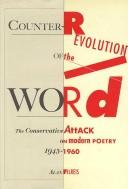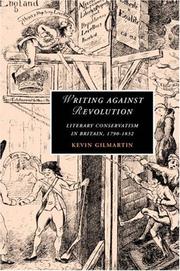| Listing 1 - 10 of 15 | << page >> |
Sort by
|
Book
ISBN: 2072651786 2072651751 Year: 2016 Publisher: Paris ( ) : Gallimard,
Abstract | Keywords | Export | Availability | Bookmark
 Loading...
Loading...Choose an application
- Reference Manager
- EndNote
- RefWorks (Direct export to RefWorks)
Qui sont les antimodernes ? Non pas les conservateurs, les académiques, les frileux, les pompiers, les réactionnaires, mais les modernes à contre-cur, malgré eux, à leur corps défendant, ceux qui avancent en regardant dans le rétroviseur, comme Sartre disait de Baudelaire. Ce livre poursuit le filon de la résistance à la modernité qui traverse toute la modernité et qui en quelque manière la définit, en la distinguant d'un modernisme naïf, zélateur du progrès. Une première partie explore quelques grands thèmes caractéristiques du courant antimoderne aux XIXe et XXe siècles. Ces idées fixes sont au nombre de six : historique, la contre-révolution ; philosophique, les anti-Lumières ; morale, le pessimisme ; religieuse, le péché originel ; esthétique, le sublime ; et stylistique, la vitupération. Joseph de Maistre, Chateaubriand, Baudelaire, Flaubert d'un côté, de l'autre Proust, Caillois ou Cioran servent à dégager ces traits idéaux.Une seconde partie examine quelques grandes figures antimodernes aux XIXe et XXe siècles ou, plutôt, quelques configurations antimodernes majeures : Lacordaire, Léon Bloy, Péguy, Albert Thibaudet et Julien Benda, Julien Gracq et, enfin, Roland Barthes, « à l'arrière-garde de l'avant-garde », comme il aimait se situer. Entre les thèmes et les figures, des variations apparaissent, mais les antimodernes ont été le sel de la modernité, son revers ou son repli, sa réserve et sa ressource. Sans l'antimoderne, le moderne courait à sa perte, car les antimodernes ont donné la liberté aux modernes, ils ont été les modernes plus la liberté. Prix de la Critique de l'Académie française 2006
Conservatism and literature --- French literature --- Modernism (Literature) --- History and criticism.
Book
ISBN: 9783593383347 Year: 2007 Publisher: Frankfurt am Main Campus
Abstract | Keywords | Export | Availability | Bookmark
 Loading...
Loading...Choose an application
- Reference Manager
- EndNote
- RefWorks (Direct export to RefWorks)
Architecture --- Conservatism and literature --- Conservatism --- German literature --- Aesthetics --- History --- History and criticism

ISBN: 1469606631 9781469606637 9780807831625 080783162X 9798890882134 Year: 2008 Publisher: Chapel Hill University of North Carolina Press
Abstract | Keywords | Export | Availability | Bookmark
 Loading...
Loading...Choose an application
- Reference Manager
- EndNote
- RefWorks (Direct export to RefWorks)
During the Cold War an unlikely coalition of poets, editors, and politicians converged in an attempt to discredit--if not destroy--the American modernist avant-garde. Ideologically diverse yet willing to bespeak their hatred of modern poetry through the rhetoric of anticommunism, these ""anticommunist antimodernists,"" as Alan Filreis dubs them, joined associations such as the League for Sanity in Poetry to decry the modernist ""conspiracy"" against form and language. In Counter-revolution of the Word Filreis narrates the story of this movement and assesses its effect on American poetry
Modernism (Literature) --- American poetry --- Conservatism and literature --- Politics and literature --- Literature and conservatism --- Literature --- History and criticism. --- History

ISBN: 9780807831625 080783162X Year: 2008 Publisher: Chapel Hill University of North Carolina Press
Abstract | Keywords | Export | Availability | Bookmark
 Loading...
Loading...Choose an application
- Reference Manager
- EndNote
- RefWorks (Direct export to RefWorks)
American poetry --- Conservatism and literature --- Modernism (Literature) --- Politics and literature --- History and criticism. --- History --- 20th century --- History and criticism --- United States
Book
ISBN: 0813166640 0813166195 0813166209 9780813166193 9780813166209 9780813166643 9780813166186 0813166187 0813175275 Year: 2015 Publisher: Lexington University Press of Kentucky
Abstract | Keywords | Export | Availability | Bookmark
 Loading...
Loading...Choose an application
- Reference Manager
- EndNote
- RefWorks (Direct export to RefWorks)
merging from two decades of the Great Depression and the New Deal and facing the rise of radical ideologies abroad, the American Right seemed beaten, broken, and adrift in the early 1950s. Although conservative luminaries such as T. S. Eliot, William F. Buckley Jr., Leo Strauss, and Eric Voegelin all published important works at this time, none of their writings would match the influence of Russell Kirk's 1953 masterpiece The Conservative Mind. This seminal book became the intellectual touchstone for a reinvigorated movement and began a sea change in Americans' attitudes toward traditionalism. In Russell Kirk, Bradley J. Birzer investigates the life and work of the man known as the founder of postwar conservatism in America. Drawing on papers and diaries that have only recently become available to the public, Birzer presents a thorough exploration of Kirk's intellectual roots and development. The first to examine the theorist's prolific writings on literature and culture, this magisterial study illuminates Kirk's lasting influence on figures such as T. S. Eliot, William F. Buckley Jr., and Senator Barry Goldwater--who persuaded a reluctant Kirk to participate in his campaign for the presidency in 1964. While several books examine the evolution of postwar conservatism and libertarianism, surprisingly few works explore Kirk's life and thought in detail. This engaging biography not only offers a fresh and thorough assessment of one of America's most influential thinkers but also reasserts his humane vision in an increasingly inhumane time.
Conservatism --- History --- Kirk, Russell. --- Authors, American --- Conservatism and literature --- Intellectuals --- College teachers --- Literature and conservatism --- Literature --- Kirk, Russell Amos --- Conservatives --- United States --- Biography --- 20th century
Book
ISBN: 9782070469185 2070469182 Year: 2016 Publisher: [Paris] : Gallimard,
Abstract | Keywords | Export | Availability | Bookmark
 Loading...
Loading...Choose an application
- Reference Manager
- EndNote
- RefWorks (Direct export to RefWorks)
Conservatism and literature --- Modernism (Literature) --- French literature --- Conservatisme et littérature --- Modernisme (Littérature) --- Littérature française --- History --- History and criticism --- Histoire --- Histoire et critique
Book
ISBN: 9070530589 9789070530587 Year: 1984 Volume: 12(1984)2 8 Publisher: Antwerpen : Restant,
Abstract | Keywords | Export | Availability | Bookmark
 Loading...
Loading...Choose an application
- Reference Manager
- EndNote
- RefWorks (Direct export to RefWorks)
Ideologieën --- Idéologies --- Letterkunde --- Littérature --- Politiek --- Politique --- Conservatism and literature. --- Fascism and literature. --- Politics and literature. --- Politics and literature --- Fascism and literature --- Conservatism and literature --- Literature --- -Fascism and literature --- Literature and conservatism --- Literature and fascism --- Belles-lettres --- Western literature (Western countries) --- World literature --- Philology --- Authors --- Authorship --- Literature and politics --- Political aspects
Book
ISBN: 1283383187 9786613383181 0813549957 9780813549958 9780813547985 0813547989 9781283383189 661338318X Year: 2010 Publisher: New Brunswick, NJ Rutgers University Press
Abstract | Keywords | Export | Availability | Bookmark
 Loading...
Loading...Choose an application
- Reference Manager
- EndNote
- RefWorks (Direct export to RefWorks)
Highlighting the works of William Bennett, Lynne Cheney, Bill O'Reilly, and others on the American political right, Michelle Ann Abate brings together such diverse fields as cultural studies, literary criticism, political science, childhood studies, brand marketing, and the cult of celebrity. Raising Your Kids Right dispels lingering societal attitudes that narratives for young readers are unworthy of serious political study by examining a variety of texts that offer information, ideology, and even instructions on how to raise kids right, not just figuratively but politically.
Conservatism --- Right and left (Political science) in literature. --- Conservatism and literature --- Politics and literature --- Children's literature, American --- Literature --- Literature and politics --- Literature and conservatism --- History --- History and criticism. --- Political aspects

ISBN: 9780511484223 9780521861137 9780521142199 9780511270239 0511270232 0511268157 9780511268151 0511268823 9780511268823 0511484224 0521861136 9786610750580 6610750580 0521142199 110716799X 1280750588 0511269676 0511322968 9781280750588 9780511269677 9780511322969 Year: 2006 Publisher: Cambridge ; New York : Cambridge University Press,
Abstract | Keywords | Export | Availability | Bookmark
 Loading...
Loading...Choose an application
- Reference Manager
- EndNote
- RefWorks (Direct export to RefWorks)
Conservative culture in the Romantic period should not be understood merely as an effort to preserve the old regime in Britain against the threat of revolution. Instead, conservative thinkers and writers aimed to transform British culture and society to achieve a stable future in contrast to the destructive upheavals taking place in France. Kevin Gilmartin explores the literary forms of counterrevolutionary expression in Britain, showing that while conservative movements were often inclined to treat print culture as a dangerously unstable and even subversive field, a whole range of print forms - ballads, tales, dialogues, novels, critical reviews - became central tools in the counterrevolutionary campaign. Beginning with the pamphlet campaigns of the loyalist Association movement and the Cheap Repository in the 1790s, Gilmartin analyses the role of periodical reviews and anti-Jacobin fiction in the campaign against revolution, and closes with a fresh account of the conservative careers of Robert Southey and Samuel Taylor Coleridge.
Conservatism and literature --- Counterrevolutions --- Press and politics --- Politics and the press --- Press --- Advertising, Political --- Government and the press --- Journalism --- Revolutions --- Literature and conservatism --- Literature --- History --- Political aspects --- Great Britain --- France --- Literature and the revolution. --- Arts and Humanities
Book
ISBN: 0826272851 9780826272850 9780826219855 Year: 2012 Publisher: Columbia University of Missouri Press
Abstract | Keywords | Export | Availability | Bookmark
 Loading...
Loading...Choose an application
- Reference Manager
- EndNote
- RefWorks (Direct export to RefWorks)
Conservatism and literature --- Agrarians (Group of writers) --- Criticism --- Conservatism --- Fugitive-Agrarians (Group of writers) --- Nashville Agrarians (Group of writers) --- Southern Agrarians (Group of writers) --- Vanderbilt Agrarians (Group of writers) --- American literature --- Conservativism --- Neo-conservatism --- New Right --- Right (Political science) --- Political science --- Sociology --- Evaluation of literature --- Literary criticism --- Literature --- Rhetoric --- Aesthetics --- Literature and conservatism --- History --- Technique --- Evaluation --- Southern States --- American South --- American Southeast --- Dixie (U.S. : Region) --- Former Confederate States --- South, The --- Southeast (U.S.) --- Southeast United States --- Southeastern States --- Southern United States --- United States, Southern --- Intellectual life --- Civilization --- Conservatism and literature.
| Listing 1 - 10 of 15 | << page >> |
Sort by
|

 Search
Search Feedback
Feedback About UniCat
About UniCat  Help
Help News
News